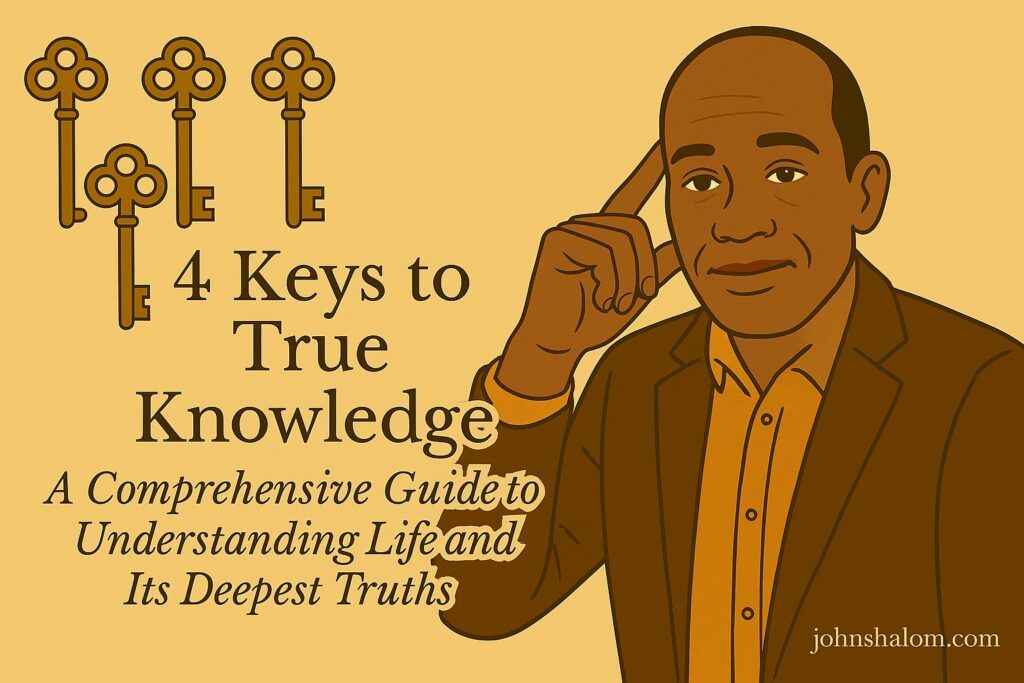
TL;DR:
True wisdom isn’t just knowledge—it’s how you use it. These four keys—humility, reflection, experience, and discernment—help you see life clearly and act wisely. Wisdom grows through patience, learning, and the courage to admit you don’t know everything.
FAQs: Keys to True Wisdom
1. What are the four keys to true wisdom?
Humility, reflection, experience, and discernment—each one shapes how you think, decide, and grow.
2. Why is humility essential to wisdom?
Because wisdom begins when you recognize there’s always more to learn, no matter how much you know.
3. How does reflection deepen understanding?
It turns information into insight by allowing you to pause, question, and learn from your experiences.
4. Why is experience a key part of wisdom?
Experience teaches lessons that theory can’t. It shapes judgment and builds emotional intelligence.
5. How can I cultivate wisdom daily?
Listen more, judge less, learn from mistakes, and choose actions guided by understanding rather than ego.
Introduction
Welcome to 4 Keys to True Wisdom. The term true wisdom suggests the existence of false or counterfeit wisdom, which is the direct opposite of genuine wisdom. If this thought crossed your mind, then you are already on the right path to understanding wisdom.
There are three types of wisdom: the wisdom of this world, the wisdom of men, and the wisdom of God. True wisdom, like true knowledge, is derived from God. It is wisdom based on divine truth and understanding.
Now, let’s explore these four keys to true wisdom. Can everyone access these keys? Let’s find out.
Key #1: Attentive Listening – The Foundation of Wisdom
Attentive listening is crucial in the pursuit of wisdom. Without it, understanding and knowledge cannot be attained.
Whether you are listening to a speaker, watching a video, or reading an article, your level of attention determines how well you absorb and process information. Divided attention leads to misunderstandings and missed insights.
Many people fail to grasp important knowledge because they are not fully engaged. To truly gain wisdom, you must:
- Listen actively
- Eliminate distractions
- Seek clarity when something is unclear
The wisdom of God begins with hearing and understanding His word. If you are inattentive, you risk missing the knowledge that leads to true wisdom.
Key #2: True Understanding – Seeing Things Through God’s Perspective
True understanding is the ability to correctly interpret and apply knowledge. Misunderstanding, on the other hand, often occurs without the individual realizing it.
Understanding rooted in human perception is incomplete. God provides divine understanding about:
- Who He is
- Who we are as individuals
- The purpose of human existence
- The nature of His creation
This divine understanding reveals the deeper meaning of life and guides us toward true wisdom. Without it, we rely on incomplete and often misleading human reasoning.
Key #3: True Knowledge – The Pathway to Wisdom
True knowledge goes beyond facts and information—it is revelation knowledge from God. It is the understanding of oneself, others, and the world through divine insight.
Many people define themselves based on societal perceptions, personal experiences, or other people’s opinions. However, true knowledge comes from understanding who we are according to God’s view.
To attain true knowledge, one must:
- Seek revelation from God
- Trust in divine wisdom over human reasoning
- Differentiate between worldly knowledge and God’s truth
True knowledge provides a strong foundation for wisdom, allowing individuals to navigate life with clarity and purpose.
Key #4: True Wisdom – The Application of Divine Knowledge
True wisdom is the application of knowledge gained through God’s truth. The world offers a counterfeit form of wisdom, which is often rooted in deception, pride, and self-interest.
Characteristics of True Wisdom:
- God-Centered: Rooted in divine truth rather than human logic
- Purposeful: Recognizes that every life event has meaning
- Truthful: Rejects deceit and embraces honesty
- Eternal Perspective: Acknowledges that life on earth is temporary and that accountability extends beyond this world
Example: Wisdom in Action
One day, I took a bus ride and paid 500SSP for a fare that was supposed to be 400SSP. The conductor did not return my balance. Later, I learned that I had been overcharged.
There were two possible scenarios:
- The conductor was unaware of the correct fare and mistakenly took the extra money.
- He intentionally deceived me, knowing I was unfamiliar with the fare rates.
If the latter was true, he operated under false wisdom—the cunning, deceptive wisdom of the world. However, true wisdom recognizes that every action is seen by God and that everyone will be held accountable.
True wisdom is not about outsmarting others for personal gain but about living with integrity and a God-centered perspective.
The Battle Between True Wisdom and False Wisdom
The enemy works tirelessly to deceive people into believing that life ends at death, removing any sense of accountability. However, true wisdom acknowledges the reality of divine judgment and the eternal consequences of our actions.
You might also like: The Complete Guide to Theology: Faith, Reason, and Modern Interpretations
False Wisdom:
- Rooted in deception and self-interest
- Encourages moral compromise
- Ignores divine accountability
True Wisdom:
- Based on divine knowledge and truth
- Guides actions with integrity and purpose
- Recognizes the eternal implications of choices
Conclusion
To attain true wisdom, you must embrace these four keys:
- Attentive Listening – Engage fully in the pursuit of knowledge.
- True Understanding – Seek divine perspective over human reasoning.
- True Knowledge – Gain revelation knowledge from God.
- True Wisdom – Apply God’s truth in daily life.
Wisdom is not merely about intellectual capacity but about aligning one’s thoughts, actions, and decisions with divine truth. It requires humility, faith, and a willingness to learn from God’s perspective.
Shalom!


